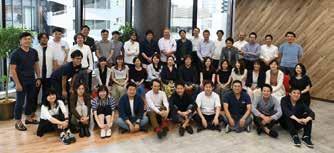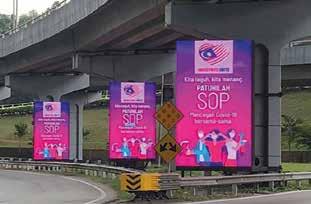
22 minute read
New Members
VALUEDESIGN MALAYSIA SDN BHD
Valuedesign combines Prepaid, Marketing and Cashless into one solution.
Headquartered in Japan and being public listed, Valuedesign is Japan’s No. 1 prepaid system with 800 brands, 70,000 stores and 15 years of brand reliability. Valuedesign provides in-house Prepaid Card (E-Wallet) for customer loyalty, branding and target marketing.
The prepaid system encompasses points, coupons & bonus cashback. This includes E-Gift Cards, E-Coupons, Mobile Apps and CRM system with customer analytics to increase customer visitations. Clienteles includes KFC, Pizza Hut, Costa Coffee, Apollo Pharmacy, Benetton in India; Fairprice in Singapore and Trial, public-listed supermarket in Japan on AI Technology. “We are bringing this same Japan system to Malaysia,” said Country Manager Lisa How.
On the joining MRCA, she added, “We want to help retailers to stay competitive in this online e-commerce era. Valuedesign Prepaid Card as a payment method helps retailers reduce and even to the extent of eradicating online payment gateway cost. In addition, retailers obtain cash reserves, secure advance sales, and create marketing funds whilst enabling customer analytics for target marketing.”
EZZYBUCKS SDN BHD
Vanilla Crepe offers one of the best sweet tooth fixes in Malaysia. To date , its 30-layer crepes have won the hearts of people in the country and more importantly, it has maintained the classic yet exquisite taste through the use of an original French recipe but homegrown in Malaysia.
The company’s Founder & CEO Nelson Liew, set up the company and its brand in 2014. Today, it has 28 outlets nationwide and has been officially inducted into the Malaysia Book of Records as “The Largest Mille Crepe Chain in Malaysia”.
Vanilla Crepe now aims to have a presence in all the states before moving on to make its mark on the global stage.
On joining MRCA, Jesvinder Singh, General Manager of Ezzybucks Sdn Bhd, said, “It is an honour and privilege to be a part of an organisation so reputable and being a benchmark to many in the industry.”


MAL MBG BUSINESS GROUP SDN BHD
Malaysia Business Group (MBG) is driven by a group of business professionals who share the same vision to position Malaysian food & beverage manufacturers as the preferred and globally competitive trading partners to the rest of the world.
MBG’s mission is to be the catalyst in providing Malaysian-based food & beverage businesses with networking prospects, knowledge exchange, and developing effective relationships between various business chambers and trade expo organisers to further facilitate business opportunities for their clients.
The company’s active approach has always been in a few key areas of focus such as exhibitions – physically and virtually, cost saving measures through group collaboration, market understanding and expansion, and corporate social responsibility (CSR).
PROMERITUS SDN BHD
Promeritus, a MSC company is a holistic HR business and digital consulting firm, enabling organisational and digital transformation while ensuring positive social impact to society. Promeritus is a wholly owned local organisation with expertise and experience from Asia Pacific, Europe, and United States. Promeritus believes strongly in heart and head, in being more human and personal whilst using digital and analytics to improve, measure and grow.
Headquartered in Malaysia, the company works closely with its global partners and alliances. Promeritus services include HR Business Consulting, Digital Promeritus that offers BPO & tech trainings, career management platform and employability platform. In addition, the company also creates social impact programs by empowering women, children, and youths and also our e-commerce division for personal care, natural & health care.
Malini Vijaya Rajah, Managing Director of Promeritus
Today, MBG has firmly rooted itself as an effective and engaging platform that drives exposure and growth for Malaysian-based food & beverage businesses across the globe.
Jimmy Ling, Director of MBG said that MRCA is an excellent platform for Malaysian food manufacturers to partner food retailers in kitchen ingredients supply and beyond. “MRCA and MBG share the same vision and mission for Malaysian based companies to grow and expand, not only locally but internationally too. Besides business networking, we are also able to embark on CSR together through various NGOs network. Together, We Are Stronger, a tagline we believe in for a better Malaysia,” he said.
said “MRCA membership was recommended to us by a trusted member as the industry organisation to join. MRCA has always been responsive and efficient in our dealings with them and questions never go unanswered. Its team’s services are most invaluable and have assisted us on many occasions. We look forward to a great membership and mutually valued partnership.”


Founded in 2004, Manforce Group is one of the leading foreign worker solutions providers in Malaysia and prides itself as a “one-stop” centre supplying human capital and management services to various industries in the country. Group Managing Director, Dato’ Paul Wong Boon Ming, speaks about the challenges faced in view of the current pandemic and how his company is overcoming them.
What are your views regarding the job market situation in view of the COVID-19 pandemic?
Since the COVID-19 pandemic started, along with the Movement Control Order (MCO), this has put most businesses in a panic chaos, as there has been a halt in bringing foreign workers to the country. Adding to this, Malaysia is also experiencing an increase in the unemployment rate by 3.9% as indicated by the Department of Statistics Malaysia (March 2020) – strongly affecting the workforce caused by the pandemic.
Overall, there are a lot of employment opportunities in Malaysia. One of the factors leading to high unemployment rate in the country is that people are unsure of where to look for these jobs or to find the resources needed to be equipped with the necessary skills.
COVID-19 has disrupted the world economy and has seen a growth in e-commerce in all countries, including Malaysia. In the post COVID-19 world, how will Manforce Group fare?
We believe there are always opportunities within every crisis. Not all industries are badly hit by the pandemic; some were able to survive the storm better than others. Likewise, it also creates an opportunity for our company to provide our clients with new solutions – the Malaysians Development Uplift Programme.
This programme is aimed at empowering young Malaysians with the necessary skills of learning, life and work; enhancing sustainable growth with skilled workforce through basic industrial training and ensuring that young Malaysians fully understand and exceed the expectations of employers.
What are your business concerns in the coming year and beyond?
The status of new intake of foreign workers is still pending, and the enrolment of locals will be disrupted if the coronavirus cases spike continue.
How will Manforce Group help its clients get through these challenging times?
With the introduction of the Malaysians Development Uplift Programme we hope to help our clients overcome the issue of manpower shortage. This programme is about connecting employers who are in need of people to execute the labour task, and for individuals who are in need of a job or to have at least minimal skill levels for a particular work. Firstly, we’ll source for suitable candidates in different regions and place them at the clients’ work place as practical trainees for 6 months. Clients can retain these individuals by recruiting them as permanent employees after the programme ends. This programme will help accelerate Malaysian businesses which, in turn, will rejuvenate the economy.

What are some of the recruitment challenges your organisation is currently facing?
It’s challenging to find Malaysians willing to perform jobs that are perceived to be not desirable. We’re also witnessing an increasing disconnect between the educational system in schools and the need of today’s students.
How do you overcome these challenges?
We are collaborating with local
authorities to conduct briefings and introducing the Malaysians Development Uplift Programme to the locals, especially in rural areas. We are also collaborating with the local academies to customise the syllabus with the view to shifting the present experience of youths to the acquisition of assets for tomorrow.

How do you effectively find, interview, assess and create a connection with job candidates in a labour market in the new normal?
With the latest technology such as Zoom, WhatsApp and cloud apps, we can easily conduct briefings, interviews and training with the candidates from different locations.
Can you share with us the various processes of recruiting and employment of foreign and local workers? • General Processes of Foreign Workers Management Services
We liaise with our clients to understand their human resource needs such as the number of foreign workers required, job description, duration and its related welfare requirements.
Working closely with our foreign partners, we will match the requirements of our clients with the suitable foreign workers and prepare a proposal specifying the terms and conditions, including fees structure. Typically, as required under the Malaysian employment policies, Manforce Group will try to source local workforce. However, in the event of lack of interest from local workforce, it will be necessary to proceed with the application for foreign workers recruitment quota.
• General Processes of Malaysians Development Uplift Programme
We liaise with our clients to understand their human resource needs such as the number of locals required, and job description. We work closely with our academies’
ABOUT MANFORCE GROUP
Founded 17 years ago, Manforce Group is one of the leading foreign worker solutions providers in the country, prides itself as an end-to-end solutions provider in local and foreign workersrelated matters.
The company is not only involved in the businesses of workers management services, but also provides manual labour services, worker insurance products and services as well as comprehensive general cleaning and maintenance services. Among its clients are electrical and electronic manufacturers, shopping centres, food and beverage service providers as well as hospitality and convenience stores.
Its dynamic, highly-trained and professional team possesses invaluable and expansive industry know-how that are vital to meet the growing needs of the evolving labour force. The team provides solutions on employment of local and foreign workforce, get the approvals from the relevant departments as well as after sales services such as monthly payroll, hostel management in compliance with Minimum Standards of Housing and Amenities Act (Act 446), transportation arrangement, renewal and extension of work permit, insurance coverage and claim, and etc.
To achieve sustainable high performance in the workplace and services to customers, Manforce Group is evolving to adopt digitalization to simplify and automate the process focuses in worker and hostel management. MTS is a fully in-house developed system to keep track of workers’ profile, location, movement, payroll, annual renewal of work permit, visa, passport, medical report and etc.
The company will continue to innovate and remain committed in catering to the labour needs of various industries in Malaysia, as it strives to become the No. 1 player in the Malaysian workforce solutions provider market.
partners to source and screen the applicant to match the requirements of our clients. The candidates will be sponsored by Manforce Group to participate in a 6-months practical training course, complete with allowances, accommodation, and a certificate by the School of Professional and Continuing Education (UTMSPACE) and ProCel Faculty Economy and Business UNIMAS. General processes can be found in our website.
Apart from providing human capital and management services, what other services does Manforce Group provide?
Apart from human capital and management services, we also provide comprehensive general cleaning and maintenance service in office buildings, hospitals and shopping centres.
What are your company’s USPs that put you above your competitors and where do you see your business five years from now?
We believe in selling true value and reliable solutions to our clients that will guarantee long term benefits in return, and in five years’ time, we plan on being listed in the ACE Market.
Technology - Retail Future in Digital (RFiD)
By Stan Jit Singh, Secretary-General, MRCA
“Change is a must as you can never step at the exact spot twice when crossing the the same river.” – Heraclitus
Demystify – Big Data in Business & Value of Data
In today’s business world, Data has become the most important and significant single out “currency”. Without understanding its power and use in businesses across boundaries, organisations will not be able to sustain, align, and have the agility to scale up and influence growth. The accuracy, dependability, reliability, and the proper use of data is key in building great business planning and strategies. In the absence of this, it will be difficult to declare a position of strength, recognise weakness, forecast profitability, and will inhibit the business to take alternative business routes to drive the organisation forward.
Without proper and adequate data on hand, most likely it will simply be based on “guess-work”, “gut-feel predictions” or “hearsay and general market sentiments”. All these so called “man-made” predictive methods or values that are based on nothing more than “just following the signs”, are deemed obsolete methodologies, If this is if applied to make critical business decisions over time it will have devastating consequences as none of these strategies will productively and effectively work. All future actions, strategies and business changes must be based on factual data derived from every transactional area that is gathered, produced, and analysed from all data points, touch points, and data sources in running the business effectively.
Gone are the days where the retailer knows every member of your family by name, what you regularly buy, how much you owe the retailer, which was usually recorded in the famous ledger called “Book 555”, and sometimes the retailer can also deliver the goods required without ordering. Such data, even though it existed in a tacit form, was readily available for the retailer’s use for its effectiveness. However, over time this so-called data reliability in managing true customer management and one-toone relationship has vanished and today, retailers are trying their best to use data derived from various technology sources to drive to the future. Not easy.
Incidentally, I once asked a retailer dealing with toys, how he marked down products that were in his stores which might not be moving. His response shocked and startled me. He said, “When I pick up the item (toy) to examine and if there is dust on the bottom, it’s time to mark down”. I did not see that response coming and only if he knew that there were other dependencies that he could have relied upon to reflect and make better informed decision, that is, rely on his business transacted data even though it was manually crafted. Was his response correct? Perhaps not, However, if this person was employed as my Merchandising Manager, I know that I will be in serious trouble.
Even in today’s retail business such close practices are still deployed in making business decisions rather than relying on data that shows the valuable facts and trends that is based on information gathered from various data points and sources from sales performances, customer touch points and inventory movement data points. One tends to omit the fact that today it is the customer who drives demand in the business.
Data Risks & Management
All That Needs To Be Invented Has Already Been Invented, 80% of Data Hacking Comes From Internal Sources
Technology Does Not Eliminate Data Security Risks, But Rather Reduces The Risks Only Up To A Certain Point And Rest, Depends On Controls Set
But What Drives The Data Security Risks To Lower Its Impact Is Data Governance, Monitoring & Regular Data Audit Reviews To Ensure Data Integrity is Sustainable
Business Intelligence (BI) Diagram – Simplified View
Data Generated From; Sales, Customers, Suppliers, Inventory, Purchase Orders & Accounting Transactions
Looks Backward To Provide Data Analytics & Results To Show Movements, Trends, Comparisons, Price Points…… To Make Business Decisions
BI Solutions Looks Forward To Suggest Potential Occurrences & What Remedial Steps To Take In Moving Forward
Bi Solutions With Predictive & Prescriptive Analytics Solutions
Data Gathered
If retailers are cognisant of this reality and truth it will bring them to an advantage point to make the necessary changes especially when dealing with psychographics of merchandising to change their product lines and offerings to expand their business boundaries as well. Sadly, at the same time huge opportunities and targets are missed very often than not due to a lack of information or simply not able to interpret the data for its true value and position to take the business forward based on predictive and prescriptive actions, and fixed business and operational gaps when moving forward.
Against this background let us diffuse the myth between Large/ Huge Data and Big Data and examine to see what has transpired in businesses today.
Many organisations and in particular, retail, have deployed retail applications systems (RAS) and few have also added business intelligence systems (BIS) with analytical capabilities to take the transacted data from the RAS system to analyse the data in BIS to provide meaningful and desired information/results.
Traditionally, all RAS has standard reports that are fixed in formats, size, columns, and data image presentation and you cannot change the report layout except through a customisation or modification process, with cost involved, and users also cannot do what we call, data-on-demand on the fly. However, report that is produced by the BIS is dynamic in nature and users can slice and dice the data that is displayed, meaning, changing the data position, adding or subtracting its position, taking data from other tables to cross check and interrogate the data to do “what if” analysis on the fly to compare and bring this to its desired point to measure the results to make certain business decisions. Unfortunately, in the standard report environment this cannot be achieved.
There are also other considerations in today’s business world where the likes of business data which has grown exponentially resulting in “Huge Data or Large Data” as it’s known, and this differs from the notion that your organisation has “Big Data” which to many, brings in some degree of confusion. The difference between Huge Data or Large Data (LD) and Big Data (BD) is that LD operates on structured data, meaning, data that is transactional in nature comes from the RAS, such as sales data, accounting data, inventory data, customer data and so on. These pieces of data created has fixed length, formats, data sizes and so on, depending on the data table which in turn is shown in the standard reports.
When data continues to grow in your business relatively, hard disk storage space equally needs to be increased to house the growth in data size. You often hear from your IT Department that the disk storage space needs to be increased to cope with the increase in data size. Take note that the original source of this data comes from your RAS and as long as there are daily transactions data will continue to grow. When the data size is very large, it may require a second or add-on space to provide additional storage, and in this scenario, your organisation has, what we call, Large/Huge Data which differs from Big Data, because BD will contain data that is both structured and unstructured. Notice that your RAS only deals with structured data.
Today, newer technologies have also played a huge role in disrupting the business environment in creating the data evolution that is derived from various data points and sources, How these pieces of unstructured data that is created
Total Data Strategy & Planning
Availability
Data Qualification & Readiness
Data Profiling & Labeling
Confidentiality
Enterprise Data Mgmt & Integration
Data Segmentation/ Ownership
Data Security/ Allocation
Integrity
are collected, organised, aligned, processed, and produced is helping businesses to bring in greater understanding in knowing where it’s heading especially in the various business models/formats and how to take it to the next level.
Outside of your RAS, data that is triggered, generated and collected that comes from other data sources such as Internet Commerce, Social Media, Cameras (Video), Call Centres (Voice), and other Digital Devices, which is unstructured, needs to be all arranged and aligned to make business sense to give you the visibility across your business ecoenvironment so that information generated by the BIS will provide insights as to what is happening in your business and operations, and what steps can be taken to overcome the challenges or steps taken to improve and influence growth in your business. In this scenario these pieces of data have different characteristics, meaning they vary in data formats, sizes/ volumes, varieties, velocity / speed, and data structure.
When this occurs in your business, your organisation now has elements of Big Data that will require a comprehensive BIS that has capability of taking both structured (from RAS) and unstructured pieces of data to make meaningful business sense.
In retailing specifics, there are five areas of focus – Sales, Customers Touch Points, Inventory Movement Data Points, Vendors/ Suppliers Performance and Store Operation Data Points.
Data in today’s Digital Retailing, where technology has played a role in generating, and how the Digital Data that is generated in the business need a good degree of control and discipline to ensure that not only is it protected and safeguarded from all harm such as data breach, data loss, data accuracy, data reliability, but in turn the information generated can also be harnessed to create new business opportunities, business models and expansion plans.
Note that Big Data is not a “technology” per se but a term used to denote varieties of data that exist in your business and there are underlying technologies within the Big Data umbrella to seamlessly connect these pieces of structured and unstructured data to give business owners the sense, feel, and direction of the business and any productive action that needs to be taken to improve and be profitable.
Let me move further to add other pointers to underline the importance of data security, data management and data compliance initiatives when dealing with business data and what exactly is Business Intelligence (BI).
Let me start with BI. When transacted data is viewed through the lens of any BI systems, it will only produce data views based on historical data, “what happened yesterday or prior”. This is good for now, but what about for tomorrow or the future? What do I need to do with the informed guidance that business needs to make any future considerations?
If you are thinking along this line, then you are on track. What is “missing” in the BI process besides providing analytical information are two more key functions or intelligence process that will be required to make the whole BI process complete. They are: “Predictive” (What can happen next?) and “Prescriptive” (What measures can I take?) capabilities so that the business’s future strategies and initiatives can be aligned based on the results drawn from the business transacted data. In this scenario, elements of Artificial Intelligence (AI) are always present. AI is another huge subject matter which we will cover in the next issue.
It is also good to consider good data practices in your organisation which not only must be viewed
Data Actions & Task Oriented Framework
Eliminate
Data Contentions Data Unstructured Data Misuse Poor Data Services Data Abuse Data Unwarranted Deletion
Raise
Data Awareness Data Integrity Data Reliability Data Dependability Data Localisation Data Efficiencies
Reduce
Data Pilferage Data Sniffing Data Overdose Data Spills Data Silos Data Pitfalls
Create
Data Knowledge Portal Data Marts / Banks Data Awareness Data Relationships Data Links
with greater importance, urgency and adhered to at all times, understanding its importance and valuable impact, but also in adverse situations which may arise when there are data breaches.
Let us not also forget there will be business changes, new models, new channels, overseas business developments, mergers or acquisitions, new business partners, and how your organisation will heavily rely its position on good data.
Nonetheless, let me highlight some of the areas that will require your utmost attention and create awareness on importance of Data Management: Core Data – Ensure to always protect your business data that contains key & invaluable information which ultimately be used in all your business strategies, development, and business technical know-how. Guard this. Shared Data – These pieces of data meant for information purposes only that the business wishes to share with closed communities such as suppliers, customers and business partners, and placed it in separate platform so that in case of a data breach, the issues arising can be isolated. Still, elements of security and access must be controlled. Submission Data – This is meant to be submitted to the Regulatory Bodies and must be provided in a secure manner especially when it is transmitted and where storage devices are used for this purpose. Business Data – Data that is used for the purposes of carrying out all transactions must be fully secured even within the organisation on accessibility whilst the external access may be secured through Firewalls and so on. Note that 80% of the hacking carried out in organisations and business systems are done internally, 20% externally. Sensitive Data – For all vital information pertaining to customers, suppliers and other parties, that is on file, the organisation needs to ensure it is fully secured, and meets PDPA (Personal Data Protection Act) and there are adequate Non-Disclosures Agreements and Disclaimers put in place to protect the company. If there is a data breach, the outcome of consequential damages is unimaginably negative. Has your organisation crafted a Data Security Policy that manages, governs, and protects your business data? Be on guard and monitor continuously. Business Continuity Data – Your organisation must always be ready to face adverse or disaster situations. Therefore, you must always have your data and information readily available to operate your business on site or remotely and, there most always be accessibility to your business data which is key. One point to strictly note in that when you are in a disaster mode, data security can be compromised and so in your Business Continuity Planning (BCP) you must underline processes to avoid such mishaps. Backed Up Data – Ensure that the data that is backed up daily or periodically is always tested for its reliability and accessibility. There were many cases where data that was required in times of need, could not be accessed or simply “missing” in adverse events, such as Ransomware / Virus attacks, and system failures, only to learn that the backed-up devices were rendered hopeless and could not be used in this critical moment of need to rely upon. Always check your devices. Value of Data – Today, data is the “New Currency” and businesses should apply to use the data effectively in developing new strategies for growth, to change the current business landscape to expand, and perhaps create new business opportunities. However, to meet this objective and goal setting, business data must always be accurate, reliable and dependable and kept securely within the organisation’s core value framework. There is a saying that “Money finds Money” and so “Good Data finds Great Opportunities”.
In the next issue, I shall write about Artificial Intelligence (AI).










